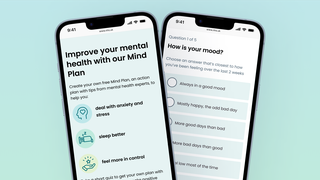Feeling low?
Feeling low is a part of all of our lives at some stage. Everyone feels upset, sad or disheartened from time to time, but for some of us it can be a real problem.
The good news is that there are things you can do to improve your mood.
What is low mood? Am I depressed?
Everyone feels low or down from time to time. It does not always mean something is wrong. Feeling low is common after distressing events or major life changes, but sometimes periods of low mood happen for no obvious reason.
You may feel tired, lacking confidence, frustrated, angry and worried. But a low mood will often pass after a couple of days or weeks – and there are some easy things you can try and small, everyday changes you can make that will usually help improve your mood.
If you're still feeling down or no longer get pleasure from things for most of each day and this lasts for several weeks, you may be experiencing depression.
The tips on this page should help, but you may also want to find out about what further support is available.
Top tips to improve your mood
Try self-help CBT techniques
Our short video guides and practical strategies can help you deal with worries, anxiety and unhelpful thoughts, work through problems in new ways and build resilience.

Increase helpful activity
Low mood can stop us doing important or enjoyable activities. Try listing these things and doing some each day. Start with easier ones and, as you progress, your mood should improve.

Talk to someone
Trusted friends, family and colleagues, or contacting a helpline, can help us when we are struggling. Watch our video for more ideas.

Get better sleep
Low moods can make us feel tired, and tiredness can also have a bad impact on our mood. Watch our video for tips to improve your sleep and create a better routine.

Boost your mood with music
Music can be a powerful way to change our feelings. See if you can create a playlist to listen to when feeling low – start with slower choices and gradually move to faster, uplifting songs. This can help your mood to gradually lift too.

A little activity every day
If you can, doing little things every day to be more active – like taking the stairs instead of a lift, or standing up to stretch your legs every so often when sitting down for long periods – can really lift your mood.
Find what works for you

Create your own free Mind Plan
Answer 5 quick questions to get your plan with practical tips to help you deal with stress and anxiety, improve your sleep and feel more in control.
Video: What you can do for low mood
Clinical academic psychiatrist professor Kamaldeep Bhui says: "One of the most important things is to stay connected."
Signs of low mood
Feeling low may cause someone to stop doing the things they like, cut themselves off from loved ones or have difficulty sleeping. Other signs include feeling:
- sad
- worried, anxious or panicked
- tired
- less confident
- frustrated, irritated or angry
A low mood should lift after a few days, but if it lasts longer than about 2 weeks, it may be a sign of depression.
Some physical illnesses can cause depression, so it's important to rule out possible physical causes or side effects from any medication you are taking.
If you're having thoughts that life's not worth living, or you're self-harming or thinking about doing so, it's important to tell someone. You do not have to struggle alone – urgent help and support is available right now if you need it.

Possible causes of low mood or depression
There are lots of things that can influence our mental health, such as our upbringing, childhood environment, things that happen to us and even our temperament.
Learn more about what affects our mental health and what support is available for life's challenges.
Support if you have low mood or depression
-
Seek NHS support
If low mood is affecting your daily life or causing you distress, call NHS 111 or talk to a GP. If you live in England, you can refer yourself for free, non-urgent NHS talking therapies without seeing a GP.
-
Charities, helplines and communities
-
Try a Reading Well book
Reading Well for mental health provides helpful information and support, with books on mindfulness and other subjects available free from your local library.
Helping someone else
Get tips and advice on helping others struggling with their mental health.
Urgent support
If you cannot wait to see a doctor and feel unable to cope or keep yourself safe, it's important to get support.
Help us improve this page!
Was this content helpful? Answer a few quick questions to help us make it better.
